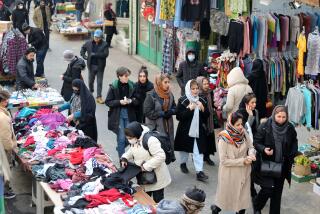No Bread on the Table : Economy: The masses will support anyone who can improve living conditions.
- Share via
Watching the scenes from Moscow on Tuesday, one was sobered by the odds against the democratic forces. Despite that, they exuded a confidence, enhanced by the fact that no arrests of Yeltsin supporters had taken place. It reminded one of the early days of Tian An Men Square, when “people power” seemed enough to overcome any obstacle the authoritarian regime might put in their way.
However, the February revolution of 1917 produced virtually no immediate arrests, and the traveling population was free to leave and enter Russia pretty much at will. It was not the presence of resistence, but the fact that it had no specific plan for addressing the country’s problems, that doomed the provisional government. Eventually the disintegrating economy and the public unrest overwhelmed it and brought about the Bolshevik coup.
The Bolsheviks also started out with a tolerance for opposition. It was not until they held elections for the Constituent Assembly in December and received only 25% of the electoral vote that real repression began. It was precisely this lack of support that prompted the Bolsheviks to commence the ruthless crackdown that spanned decades.
The Committee for the State of Emergency, no doubt, knows its Russian history. Its members also know that the fight under way right now is for the hearts and the minds of the “lumpen proletariat,” who make up the vast majority of the working population, and who are essentially apolitical. Last summer, for instance, during the dangerous “cigarette rebellion,” people laid their bodies across tram tracks to protest the shortage of cigarettes and tobacco. These protests didn’t distinguish between communist and democratic governments.
This vast but silent majority will support whomever comes forward who can address their abysmal living and working conditions and put bread on the table. Given the ferocity of complaints and dissatisfaction among ordinary people during Mikhail Gorbachev’s last days, this new regime had good reason to believe that their appeal to rescue the Soviet Union from chaos and hunger would have resonance in many parts of the population. They were probably only too mindful of the population’s mood. Black-humor jokes about public uprisings had been circulating in the capital for months.
A good case can be made that the timing of this coup was staged now, not just because of the signing of the Union Treaty, but also to ensure that the authoritarian regime could mobilize--and coerce if necessary--the human and material resources to get through the winter. They do not, however, have any long-term plans.
In the emergency resolution that was released Monday, the emergency committee decrees, for instance, that “taking into account the critical situation in harvesting and the threat of famine . . . enterprises, and office workers and employees, students and servicemen in the necessary numbers should be promptly sent to the country to save the harvest.”
It also states that “the Cabinet of Ministers should complete, within two weeks, the drawing up of plans for emergency measures to be taken to pull the country’s fuel and power complex out of the crisis and prepare for winter.” One leading energy specialist I talked to, a week before the coup, told me that it is predicted, in official energy circles, that if the Soviet Union has more than one week of weather 25 degrees below zero, the energy industry will not have enough home heating fuel to get the population through the winter in large cities such as Moscow.
The democratic response to this coup has been both stirring and heroic, and Yeltsin and his followers deserve our deepest admiration and support. However, the prospects for democracy and, eventually, a market economy will depend on the improvement of some of the catastrophic problems that the country faces. With inflation at 100% to 300% and rising unemployment, the situation is made worse by the fact that the economy itself is so militarized that 80% of all machine building in the Soviet Union is arms-related. With significant layoffs as part of the painful conversion process, one can begin to see the depths of the crisis for both the short-term and the long-term development of the country.
Americans should abandon any hope they have that the current confrontation could yield winners or losers, or that there will be an early resolution of the crisis. The only thing that will stabilize the political situation in the Soviet Union is an improvement in the economy. And that can’t be done until a well-thought-through plan is adopted that will allow for self-determination. Such an element is crucial for providing the incentive and the inspiration necessary to stimulate the Soviet people to “take ownership of their problems” and get down to the hard work of rebuilding their future. Until that happens, there could be a protracted power struggle that could create a further drop in production and a continued deterioration of the economy. Such an eventuality could ultimately herald in a force more dangerous than anything we have seen since the Great October Revolution of 1917.
More to Read
Sign up for Essential California
The most important California stories and recommendations in your inbox every morning.
You may occasionally receive promotional content from the Los Angeles Times.













